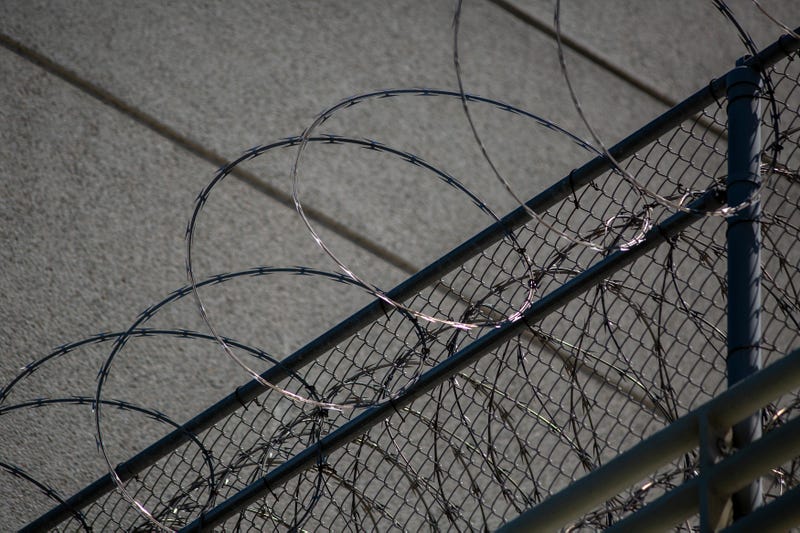
Editor's note: Crime in the Bay Area, and around California, has attracted national attention in recent months.
San Francisco's recall of former District Attorney Chesa Boudin shined a spotlight on the debate about how to increase community safety, prevent criminals from reoffending and protect victims.
In this series of special reports, KCBS Radio will examine the innovative approach of an East Bay nonprofit called the Ahimsa Collective.
In Part 2, KCBS Radio's Kathy Novak takes us back inside Soledad State Prison, where incarcerated men are hearing about one woman's extraordinary story of survival.
Warning: References to violence in these stories might be upsetting to some readers.
For more, stream KCBS Radio now.
SOLEDAD, Calif. (KCBS RADIO – The first thing that struck Jane Piper when she went inside Soledad State Prison was all of the security.
"I was a little scared at first," she told KCBS Radio. "You see all the barbed wire on the top of the buildings and the top of the fences."
But inside those fences, there are hints that it is a minimum- to medium-security prison.
There are flowers planted in a small staff garden, murals on some of the walls and, on one of the days we visited, a full band of incarcerated musicians rehearsing a Motown performance right in the middle of the yard.
Soledad was officially renamed the Correctional Training Facility in the 1960s because of the educational opportunities it offers.
"Then you walk into the room where the workshop is," said Piper, "And it's like I'm walking into a new age retreat."
Inside the room, about 25 men in their blue prison uniforms began their session with a guided meditation.
Jane Piper comes to this prison to share the story of the day a man attacked her after she'd been grocery shopping.
"He told me to get into the back seat and forced me into the back seat and ended up beating me pretty severely and raping me," she said.
Then, the man told Piper that they were going to go for a ride.
"And I just knew at that point that if I didn't get out of the car, I was probably going to be killed if I let him take me somewhere else," she continued. "So I jumped out of the window when he was driving away and ran into the grocery store."
Some of the men in the Empathize group are incarcerated for sexual assault; others for violent crimes including murder. A detail in Piper's story stuck with one of them.
"She said about when that was happening to her she could see herself, like she had this out of body experience, and it’s like her soul said, 'I don't want to be there for that moment,' " he recalled. "When she said that it was just like – ugh – it hit me because I used to minimize. I'm like, 'At least I didn't kill nobody.’ And then one gentleman – a good friend that I have – told me, 'Well look, you didn't kill the person physically but you killed her soul. You murdered a part of her.' "
Another man recalled Piper's account of how she wrestled a corkscrew from her attacker, but couldn’t bring herself to use it.
"She grabbed a weapon and yet she didn't want to hurt him," he said. "And that sounds so foreign to me. You're in a dangerous situation and the goodness of her heart didn’t want to hurt her perpetrator. How could a person be so good? And that's where I want to be – where it is so difficult for me to even attempt to harm somebody."
Not only could she not hurt her attacker, Piper decided to forgive him.
"I don't know a whole lot about what forgiveness is and what it means," she said, "But to me, it just meant that I wanted to cut off the ties to him."
Some of her friends think it is crazy that after all of that she has been through, she chooses to go into prisons.
"This is going to sound so strange," she said, "But, I feel more comfortable talking to the incarcerated than I do to other survivors sometimes. Because I feel like when people have survived violence and they’re still very close to it, and they’re raw, and they're healing and then I come out with my 'I forgave my rapist' story. I feel like, 'Oh my gosh, I’m too much.' They don't want to hear this."
But she said that taking part in this program, and believing it will help stop the men in this room from hurting others again, is healing for her.
"I would love to know that the man who raped me is in a healing place as well," she said.
To help the men here get to a healing place, Jane and other survivors are working with them on a tough project: Writing apology letters to the people they've harmed.
We'll see some of those letters in Part 3 of this series.
Special Reports from Soledad State Prison
PART 1 | PART 2 | PART 3 | PART 4 | PART 5
DOWNLOAD the Audacy App
SIGN UP and follow KCBS Radio
Facebook | Twitter | Instagram

